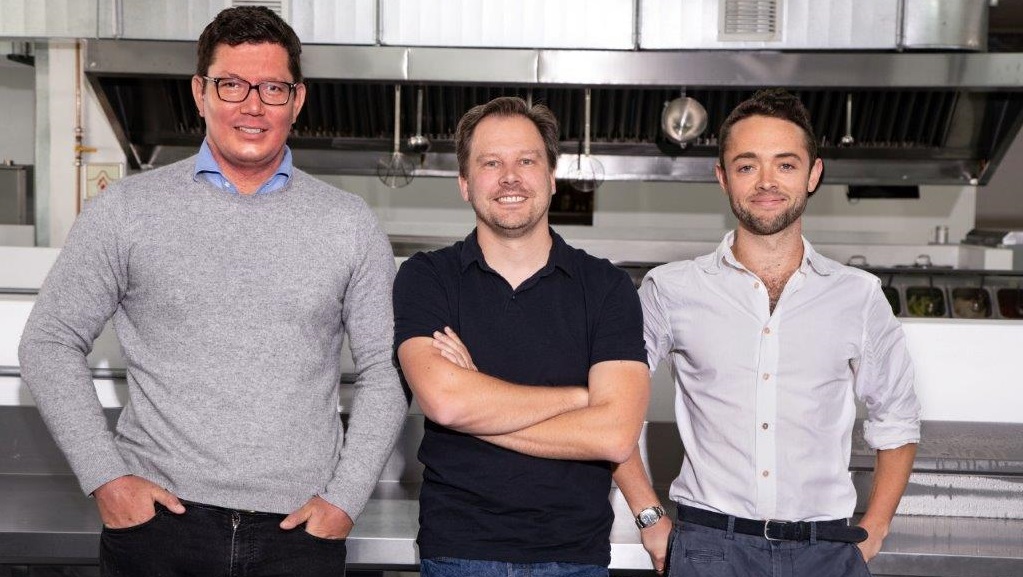Artificial Intelligence is no longer a distant promise or a Silicon Valley experiment. It’s embedded in the now. South Africans are already using generative…
Silvertree invests R5m in former OrderIn co-founder’s new dark kitchen business

Cape Town based investor Silvertree Holdings has invested R5-million in return for a majority stake in former OrderIn co-founder Heini Booysen’s new dark kitchens business.
Also known as a “ghost kitchen”, “virtual kitchen” or “cloud kitchen”, Cape Town based Darth Kitchens is a delivery-only establishment that can only be accessed via food delivery apps like UberEats, Mr D and OrderIn.
Booysen (pictured above, centre with Silvertree’s Manuel Koser and UCook’s David Torr) confirmed to Ventureburn today that Silvertree has taken a 51% stake in Darth Kitchens, and that the investor plans to inject a further amount early next year, which Silvertree put at R30-million.
Booysen left OrderIn about a year ago but confirmed that he still has a small stake in the business, which was founded by former Goldman Sachs associate Dinesh Patel in 2012 before Booysen joined as a director a year later.
The New York co-founder of Seamless, Jason Finger, helped fund OrderIn initially, said Booysen.
Silvertree Holdings has invested R5m in return for a 51% stake, in former OrderIn co-founder Heini Booysen’s new dark kitchens business
Booysen said the R5-million from Silvertree has been used to fit out a 400 square metre premises which previously served as a panel beating shop, off Bree Street in the city centre.
The funding will also serve as working capital and allow the startup to grow its current team — which currently stands at 20 permanent kitchen staff and five founding members (including two executive chefs who worked at some of South Africa’s best restaurants like The Test Kitchen and Thali).
UCook co-founder is advisor
Ucook co-founder David Torr helps out as an advisor. Silvertree has a 50% stake in his business (Silvertree invested R3-million initially in 2016 and then a further R5-million). Booysen says Torr also has a small sweat equity stake in his business, while the remaining stake in Darth Kitchens is made up of his own share and that of an employees stake.
Darth Kitchens kicked off with its first order in August, after Booysen began working on the business in March.
Those that use these apps will not see the name “Darth Kitchens”. Instead they will see the names of the business’s own five brands listed at restaurants. The brands are Buddy’s Burgers, Fluent (Health Bowls), Bagels Shmagels, Anvil Burger Co and Ringo’s NY Style Pizzeria.
Booysen said he didn’t believe customers would see this as a problem. “Whether it comes out of a dark kitchen or not, it’s still coming out of a kitchen,” he added.
‘25% cheaper than traditional restaurants’
While the kitchen had to undergo the usual health and fire inspections that restaurants undergo before receiving a license to operate, the dark kitchen has operational costs that are likely 25% less than a normal restaurant, estimates Booysen.
Rent is the business’s biggest saving. While the business operates in the city centre, rent is about 20% of what the typical restaurant would pay in the city centre because the premises is an industrial space.
However, the reliance on the order app does, he admits, add to the cost.
Between 20% and 30% of the price that a food item is sold for on an app goes to the ordering app. But Booysen says he doesn’t see this as a major challenge, as he says the revenue his business gives up is in return for the marketing that these apps perform of his food brands.
However, he admits that as a dark kitchen one is very often at the mercy of order apps. If for example one has a special on sushi that day, and the dark kitchen doesn’t offer any sushi, the dark kitchen will lose out.
But then the advantage to being a dark kitchen is that it’s easier to test new offerings and put these out as a “restaurant”. If something doesn’t work, you won’t have to pull down signs and change the decor, as you would if it was a traditional restaurant — you just pull the brand and put a new one up on the app.
While its usual for the orderings apps to give restaurants a tablet from which to manage orders, Booysen says the business has integrated the various orders of its five current brands, into a point-of-sale system — to avoid the chaos of having to deal with multiple tablets when accepting orders.
‘Up to $1bn market size’
Dark kitchens may be emerging in South Africa but it is not a new concept, with global delivery apps like Deliveroo launching these kitchens in the UK as far back as 2017, the trend has had some time to gain momentum globally.
Recently however this concept is experiencing increased interest from venture capital companies and food tech investors driven largely by players like Uber’s founder, Travis Kalanick.
Kalanick raised more than $400-million for his move into the dark kitchen space across the US, India and China and Kitchen United raised more than $40-million from Google Ventures to grow their dark kitchen network across the US.
While it’s difficult to estimate the size of the local market (because it depends on customer data held by each of the ordering apps and the sales number of restaurants), Silvertree Holdings managing partner Peter Allerstorfer estimates it to be between R500-million to R1-billion.
‘Walking into this with my eyes wide open’
Silvertree’s move to take majority stakes in the firms it invests in may have been viewed by some founders with suspicion (see this story).
But Allerstorfer says the investor aims to always ensure that the entrepreneur has a significant stake in the business — and that the entrepreneur is afforded the ability to sell their stake at a later stage. He confirmed that Silvertree is still considering a 2023 listing of its portfolio.
But does the majority stake that Silvertree has taken in the business effectively mean Booysen works for Silvertree?
“I have known Manuel (Koser) for many years and I am well aware of how they do things. I’m walking into this with my eyes wide open,” says Booysen.
He says while his experience with past investors has been that they make the investment and then expect only quarterly reports, that with Silvertree has been different.
“These guys are more involved,” he says, pointing out that Koser and his team hold weekly meetings with him and his team and have provided office space, as well as help with legal documents and accounting.
In addition, Booysen says when the business next needs to raise capital, he will gets first choice on whether to commit his own money or take Silvertree’s.
“I don’t think we’ll ever get to (Silvertree’s stake being) 100%,” he reasons, adding that he expects the business to break even in a few months time, after which there won’t be any need for further outside capital.
Right now he’s looking at where to set up the next dark kitchen. It’s likely to be in Rondebosch in Cape Town or Stellenbosch, he says, while he also plans to set up in Johannesburg soon.
Given that each kitchen can only really effectively serve a 5km radius, you can expect a lot more dark kitchens soon.
Read more: Silvertree Holdings no longer just a tech investor after rebrand, new investment
Read more: Are these six, SA’s most important venture capitalists?
Read more: Silvertree exits CompareGuru in sale to SA’s SureStart
Read more: Silvertree move to take majority stakes in startups nets mixed view from founders [Updated]
Read more: Is Silvertree’s co-entrepreneur model the answer to Silicon Valley?
Read more: Obsession with raising $1bn to become a unicorn is wrong says Silvertree man
Read more: Silvertree founder takes aim at Silicon Valley model of building African startups
*Correction: We earlier had it that Seamless co-founder Paul Appelbaum funded OrderIn — when it was in fact his co-founder, Jason Finger.
Featured image: Silvertree Investments director Manuel Koser, Darth Kitchens founder Heini Booysen and UCook co-founder David Torr (Supplied)

